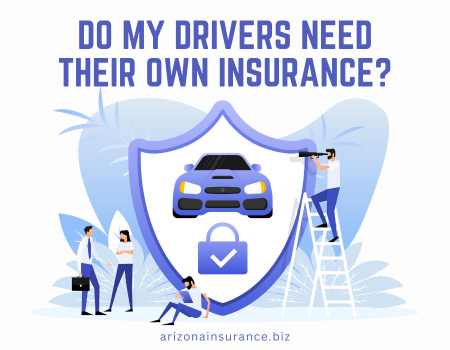For many businesses that rely on drivers to transport goods or provide services, ensuring proper insurance coverage is essential for protecting both the company and its employees. One common question that arises in this context is whether drivers need their own insurance policies. Let’s explore this topic to understand the roles and responsibilities of drivers regarding insurance coverage.
Understanding Insurance Requirements for Drivers
 Employer’s Insurance Coverage: In most cases, businesses that employ drivers are required to carry commercial auto insurance to cover their vehicles and drivers while they are performing work-related tasks. This insurance typically provides liability coverage for bodily injury and property damage caused by company-owned vehicles, as well as coverage for medical expenses and property damage incurred by the driver in the event of an accident.
Employer’s Insurance Coverage: In most cases, businesses that employ drivers are required to carry commercial auto insurance to cover their vehicles and drivers while they are performing work-related tasks. This insurance typically provides liability coverage for bodily injury and property damage caused by company-owned vehicles, as well as coverage for medical expenses and property damage incurred by the driver in the event of an accident.
- Employee Status: Whether drivers are considered employees or independent contractors can impact their insurance coverage. Employees who operate company-owned vehicles as part of their job duties are generally covered by their employer’s commercial auto insurance policy. However, independent contractors who use their own vehicles may be required to carry their own commercial auto insurance or have coverage through a hired and non-owned auto (HNOA) insurance policy.
- Non-Owned Auto Coverage: Some businesses may opt to purchase hired and non-owned auto insurance to provide liability coverage for vehicles that are not owned by the company but are used for business purposes. This type of insurance can extend coverage to employees or contractors who use their own vehicles for work-related tasks, such as making deliveries or transporting clients.
- Personal Auto Insurance: Drivers who use their personal vehicles for work-related tasks should review their personal auto insurance policies to ensure they have appropriate coverage. Personal auto insurance policies typically do not provide coverage for commercial use or business-related activities, so drivers may find it necessary to acquire additional coverage or invest in a commercial auto insurance policy to safeguard both themselves and their vehicles while performing their duties.
- Gap Coverage: In some cases, there may be gaps in insurance coverage between the employer’s commercial auto insurance policy and the driver’s personal auto insurance policy. To address these gaps, businesses and drivers may consider purchasing umbrella insurance or excess liability coverage to provide additional protection beyond the limits of their primary insurance policies.
- Consultation with Insurance Professionals: Given the complexities of insurance coverage and the potential legal and financial consequences of inadequate coverage, it’s advisable for businesses and drivers to consult with insurance professionals or legal experts to ensure they have appropriate coverage in place. Insurance agents or brokers can provide guidance on the types of coverage needed and help tailor insurance policies to meet specific needs and requirements.
- Compliance with Regulations: Businesses and drivers should also ensure compliance with state and federal regulations governing insurance requirements for commercial vehicles and drivers. Failure to maintain adequate insurance coverage can result in legal liabilities, fines, and penalties, as well as jeopardize the financial security of individuals and businesses in the event of an accident or lawsuit.
In summary, the need for drivers to have their own insurance depends on various factors, including their employment status, the nature of their work, and the types of vehicles they use. While employers are generally responsible for providing insurance coverage for company-owned vehicles and employees, drivers who use their own vehicles for work-related tasks may need to obtain additional insurance coverage to protect themselves and their vehicles. By understanding insurance requirements and seeking guidance from insurance professionals, businesses and drivers can ensure they have appropriate coverage in place to mitigate risks and protect their interests.

